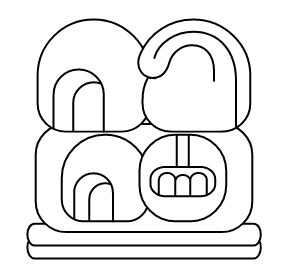Ceci est une ancienne révision du document !
![]() (Flux RSS du blog - click droit + copier l'adresse du lien, et coller dans votre lecteur RSS pour vous abonner aux articles.)
(Flux RSS du blog - click droit + copier l'adresse du lien, et coller dans votre lecteur RSS pour vous abonner aux articles.)
| Étiquette | Quantité |
|---|---|
| hieroglyphes | 2 |
| o | 1 |
| imperatif | 1 |
| unclassified | 1 |
| grammaire | 2 |
| vocabulaire | 1 |
| vocatif | 1 |
L'essentiel de la grammaire
Date de création : 22/08/2020 17:21
Prononciation et ordre des mots
Toki pona utilise 120 mots et 92 syllabes. Les syllabes, formées à partir de 14 lettres de l'alphabet (j, k, l, m, n, p, s, t, w et a, e, i, o, u), sont faciles à prononcer pour un francophone. Tous les mots de la langue s’écrivent en lettres minuscules, même en début de phrase. Les lettres se prononcent comme en français avec quelques différences : le j se prononce comme le y dans « yoyo »; le e se prononce « é » ou « è » mais pas « euh »; u se prononce « ou ». L’accent est toujours sur la première syllabe du mot.
Comme il y a très peu de mots en toki pona, la plupart des mots ont plusieurs sens. Leur fonction (sujet, verbe, complément, …) est définie par leur position dans la phrase et leur signification est précisée par le contexte.
Pas d'accords ni de temps
toki pona ne marque pas le temps, le genre ni le nombre. On ne fait donc jamais de fautes d'accords !
Particules simples
"li" introduit le(s) prédicat(s)
Quand le sujet de la phrase n'est ni mi ni sina, on intercale la particule li entre sujet et le verbe.
- ona li pona. = C’est bon.
- mi tawa. = Je vais.
- soweli li moku li lape. = Les animaux mangent et dorment / l'animal mange et dort
"e" marque les compléments d'objets directs
- mi moku e telo. = Je bois de l'eau.
- ona li lukin e mi e sina. = Ils nous regardent, toi et moi.
"en" introduit de nouveaux sujets
- mi en sina li toki. = Toi et moi parlons.
"taso" est utilisé au début de la phrase pour signifier "Mais..."
- mi wile e moku. taso sina jo e ona. = Je veux la nourriture, mais tu l'as.
Les prépositions viennent avant les compléments
- mi lon tomo. = Je suis à la maison.
- mi toki kepeken ilo. = Je parle en utilisant l’outil.
- ona li pana e moku tawa soweli. = Elle a donné de la nourriture à l’animal.
- sina sama mama sina. = Tu es comme tes parents.
- mi pilin pona tan ni. = Je me sens bien pour ça.
Les propositions ne s'emboîtent pas
ni: peut être utilisé pour les connecter.
- mi wile e ni: sina pana e sona tawa mi. = Je veux que tu m’apprennes. (Je veux ça: tu m’apprends.)
- ona li kute tan ni: sina toki. = Ils écoutent parce que tu parles. (Ils écoutent à cause de ça: tu parles.)
Tous les modificateurs viennent après ce qu'ils modifient
- tomo tawa = bâtiment mobile (une automobile)
- soweli lili = petit animal
- ona li sitelen pona. = Il écrit bien.
- ma tomo = terre de maisons (ville)
- tomo jan = la maison d'une personne
- nimi mi (li Walé) = mon nom (est Walé)
"pi" regroupe les modificateurs
- tomo telo nasa = une salle étrange d’eau (une étrange salle de bain)
- tomo pi telo nasa = une salle d'eau étrange (un bar)
Les verbes auxiliaires viennent avant le verbe
- mi ken toki. = Je peux parler.
- mi wile lape. = Je veux/J’ai besoin de dormir.
- ona li awen tawa. = Il continue.
- mi kama sona toki pona. = J’apprends à parler bien/simplement. (J’apprends à parler toki pona.)
- ona li lukin kama jo e ona. = Il essaie de l’obtenir.
"seme" remplace l'information inconnue dans une question
- ni li seme? = Qu'est-ce que c'est?
- toki! sina pilin seme? = Salut! Comment vous sentez-vous? (Comment allez-vous?)
- jan seme li lon? = Qui est là?
- sina tan ma seme? = D'où êtes-vous?
- sina kama sona kepeken nasin seme? = Comment as tu appris? (…avec quelle méthode?)
Les questions Oui / non se forment avec ...[verbe] "ala" [verbe]? ...
- sina sona ala sona e toki pona? = Connaissez-vous le toki pona?
Répète le verbe pour dire oui ou ala pour non:
- sona = oui (Je le connais);
- ala = non
... ou avec "anu seme?"
- sina sona e toki Kanse anu seme? = Connaissez-vous le français?
"ala" est utilisé pour nier les phrases
- ona li suli ala. = Ce n'est pas grand/important
- mi sona ala. = Je ne sais/comprends pas
"o" indique le vocatif, les souhaits les ordres.
Les ordres :
- o kama sona e toki pona. = Apprends toki pona.
- mi o tawa. = Allons-y.
- jan ale o kute! = Tout le monde, écoutez!
Le vocatif:
- jan Sonja o, sina pona. = Sonja, t’es bonne.
Les souhaits:
- ale o pona. = Que tout soit bon.
"la" ajoute un contexte
Heure ou lieu
- tenpo suno ni la mi pali = Aujourd'hui, je travaille.
- tomo mi la mi lape = Dans ma chambre, je dors.
Conditionnel
- sina pali la sina kama jo e mani. = Si vous travaillez, vous obtenez de l'argent.
- telo li kama tan sewi la mi tawa ala. = Si l'eau vient du ciel (il pleut), je ne vais pas.
Dictionnaire étymologique
Date de création : 15/08/2020 15:10
nimi ale pona
La plupart des listes de mots toki pona sont limitées aux mots présents uniquement dans le livre pu. Ce lexique a été conçu pour inclure tous ces mots, mais aussi ceux référencés avant la publication de pu et ceux d'usage courant tels que ceux utilisés dans la communautés en ligne, y compris les forums , Facebook, Discord et Twitter.
Origines :
- ~pre-pu~ – words created by jan Sonja in the period before the publication of pu
- ~pu~ – definitions appearing in pu
- ~alt. usage~ – usages of pu words that deviate from their definitions in pu
- ~post-pu~ – community-invented words with limited use among specific subcommunities
- ~humorous~ – words originally created as a joke
- ~prop.~ – words merely proposed as options for the community, but rejected
- ~word of Sonja~ – non-pu words presented spontaneously by jan Sonja
- (pv.) – preverb
- ← – etymology
Définitions
a – ~pu~ (emphasis, emotion or confirmation) {see kin} ←? onomatopoeia
akesi – ~pu~ non-cute animal; reptile, amphibian ← Dutch hagedis ‘lizard’
ala – ~pu~ no, not, zero; [~ ala ~] (used to form a yes-no question) ← Georgian არა ara ‘no’
alasa – ~pu~ to hunt, forage | ~alt. usage~ (pv.) try to {see lukin} ← Acadian French à la chasse ‘hunting’ ← French chasser ‘to hunt’
ale/ali – ~pu~ all; abundant, countless, bountiful, every, plentiful; abundance, everything, life, universe; one hundred | ~alt. usage~ twenty; 100; 120 ← Dutch alle ‘all’
alu – ~post-pu~ (between the main sentence and the context phrase) {see la} ← toki pona *al (la reversed)
anpa – ~pu~ bowing down, downward, humble, lowly, dependent ← Acadian French en bas ‘below’
ante – ~pu~ different, altered changed, other ← Dutch ander ‘other, different’
anu – ~pu~ or | ~alt. usage~ choose, decide ← Georgian ან an ‘or’
apeja – ~pre-pu~ shame, guilt ←? Finnish häpeä ‘shame, disgrace, dishonor’
awen – ~pu~ enduring, kept, protected, safe, waiting, staying; (pv.) to continue to ← Dutch houden ‘keep, care for, hold (in a particular state)’
e – ~pu~ (before the direct object) ←?
en – ~pu~ (between multiple subjects) | ~alt. usage~ (coordinates modifiers in a pi-phrase) ← Dutch en ‘and’
epiku – ~post-pu, humorous~ {see sikomo} ← English epic
esun – ~pu~ market, shop, fair, bazaar, business transaction ←? of Akan origin
ete – ~post-pu~ beyond, exceeding, outside of, more than {see selo, weka} ← Turkish öte “beyond, further, over”
ewe – ~post-pu~ stone, gravel, rock, pebble, lava, magma (when used, kiwen is limited to ‘metal, hardness’ {see kiwen} ← ?
ijo – ~pu~ thing, phenomenon, object, matter ← Esperanto io ‘something’ ← Romance i- ‘(relative pronoun root)’
ike – ~pu~ bad, negative; non-essential, irrelevant | ~alt. usage~ complicated, complex ← Finnish ilkeä ‘bad, mean, wicked’
iki – ~pre-pu~ {see ona} ←?
ilo – ~pu~ tool, implement, machine, device ← Esperanto ilo ‘tool’ ← German -el ‘(agent suffix)’ {cf. Schlüssel ‘key’ ~ schließen ‘lock, shut’)
ini – ~post-pu~ the digit ‘2’ ← Cantonese 二/貳 yih ‘two’
insa – ~pu~ centre, content, inside, between; internal organ, stomach ← Tok Pisin insait ‘inside, center, stomach’ ← English inside
ipi – ~pre-pu, prop.~ (presented as an early alternative to iki) {see ona} ←?
itomi – ~post-pu, humorous~ Schadenfreude, indirect insult or disrespect, shade ← English hit or miss (from the song ‘Mia Khalifa’ by iLOVEFRiDay)
jaki – ~pu~ disgusting, obscene, sickly, toxic, unclean, unsanitary ← English yucky
jaku – ~post-pu~ 100 {see ale/ali} ← Japanese 百 hyaku '100'
jalan – ~pre-pu, prop.~ foot {see noka} ←Finnish jalan ‘afoot’ (← jalka ‘foot’)
jami – ~post-pu~ eliciting a positive sensory or stimulating experience {see suwi} ← English yummy
jan – ~pu~ human being, person, somebody ← Cantonese 人 jan ‘person’
jans – ~post-pu, humorous~ a particular group of early members of the ma pona Discord ← toki pona jan and English -/z/ ‘[plural]’
jasima – ~post-pu~ reflect, resound, mirror, be on the opposite/polar end of ← Turkish yansıtmak ‘to reflect, reverberate’
jatu – ~post-pu~ the digit ‘1’ ← Cantonese 一/壹 yāt ‘one’
jelo – ~pu~ yellow, yellowish ← English yellow
jo – ~pu~ to have, carry, contain, hold {see lon, poki, lanpan} ← Mandarin 有 yǒu ‘have’
kajo – ~post-pu~ the digit ‘9’ ← Cantonese 九 /玖 gáu ‘nine’
kala – ~pu~ fish, marine animal, sea creature ← Finnish kala ‘fish’
kalama – ~pu~ to produce a sound; recite, utter aloud ← Serbo-Croatian galama галама ‘fuss, noise’
kama – ~pu~ arriving, coming, future, summoned; (pv.) to become, manage to, succeed in ← Tok Pisin kamap ‘event, arrive, happen, become, bring about, summon’ ← English come up
kamalawala – ~post-pu~ anarchy, uprising, revolt, rebellion ← toki pona ‘kama pi lawa ala’
kan – ~pre-pu~ with, among {see poka} ← ?Finnish kanssa ‘with’ or Esperanto kun ‘with’ (← Latin cum)
kapa – ~pre-pu~ extrusion, protrusion, hill, mountain, button {see nena} ← ?Dutch kop ‘head, cup’ or Esperanto kapo ‘head’ (← Latin caput)
kapesi – ~pre-pu~ brown, gray ← Greek καφές kafés ‘coffee’ or ?French café ‘light brown’
kasi – ~pu~ plant, vegetation; herb, leaf ← Finnish kasvi ‘plant’
ke – ~post-pu~ (acknowledgment or acceptance) {see oke} ← English ’kay ← okay
ken – ~pu~ (pv.) to be able to, be allowed to, can, may; possible ← Tok Pisin ken ← English can
kepeken – ~pu~ to use, with, by means of ← Dutch gebruiken ‘to use’
kijetesantakalu – ~pre-pu, humorous, word of Sonja~ any animal from the Procyonidae family, such as raccoons, coatis, kinkajous, olingos, ringtails and cacomistles ← Finnish kierteishäntäkarhu ‘kinkajou’ ← kierteis ‘spiral’ + häntä ‘tail’ + karhu ‘bear’
kili – ~pu~ fruit, vegetable, mushroom ← Georgian ხილი xili ‘fruit’
kin – ~pu~ {see a} | ~pre-pu, alt. usage~ too, also, as well ← Finnish -kin ‘too, also, still’
kipisi – ~pre-pu~ split, cut, slice {see tu} ← Iñupiat kipriruk ‘cut’ or Swahili kipisi ‘sliver, small piece of wood’
kiwen – ~pu~ hard object, metal, rock, stone ← Finnish kiven, genitive of kivi ‘stone’
ko – ~pu~ clay, clinging form, dough, semi-solid, paste, powder ← Cantonese 膏 gou ‘cream, paste’
kon – ~pu~ air, breath; essence, spirit; hidden reality, unseen agent ← Mandarin 空氣 kōngqì ‘air, atmosphere, ambience, opinion’
kule – ~pu~ colourful, pigmented, painted | ~alt. usage~ of or relating to the LGBT+community ← Acadian French couleur ‘color’
kulu – ~post-pu~ {shortened variant of kulupu}; six {particularly in senary base} ← toki pona kulupu
kulupu – ~pu~ community, company, group, nation, society, tribe ← Tongan kulupu ← English group
kuntu – ~post-pu~ laughter, humor {see musi} ← toki pona k.m.t.u ← ‘kalama musi tan uta’
kute – ~pu~ ear; to hear, listen; pay attention to, obey ← Acadian French écouter ‘listen’
la – ~pu~ (between the context phrase and the main sentence) ← Esperanto la ‘(definite article)’ ← Romance la ‘(feminine singular definite article)’ ← Acadian French -la`’(proximal & topical suffix)’
lanpan – ~post-pu~ take, seize, catch, receive, get {see jo, alasa} ← Greek λαμβάνω lamváno ‘take, seize, grasp, receive’
lape – ~pu~ sleeping, resting ← Dutch slapen ‘sleep’
laso – ~pu~ blue, green ← Welsh glas ‘blue, inexperienced’ ← Proto-Brythonic glas ‘green, blue’
lawa – ~pu~ head, mind; to control, direct, guide, lead, own, plan, regulate, rule ← Serbo-Croatian glava глава ‘head’
leko – ~pre-pu~ stairs, square, block ← ?English Lego (← Danish Lego ← ‘leg godt’ ‘play well’) or Finnish lohko ‘block, section’
len – ~pu~ cloth, clothing, fabric, textile; cover, layer of privacy ← Acadian French linge ‘clothing’
lenke – ~post-pu~ the digit ‘0’ ← Cantonese 〇/零 lìhng ‘zero’
lete – ~pu~ cold, cool; uncooked, raw ← Acadian French frette ‘cold’ ← Old French freit ‘cold’
li – ~pu~ (between any subject except mi alone or sina alone and its verb; also to introduce a new verb for the same subject) ← Esperanto li ‘he’ {cf. Tok Pisin transitive suffix -im} ← Latin ille
likujo – ~post-pu~ collection, assortment, menagerie, arrangement, handful, harvest {see kulupu, alasa}; seven ← Acadian French recueil ‘collection, ensemble, anthology’
lili – ~pu~ little, small, short; few; a bit; young ← Tok Pisin liklik ‘small, little’ ← Ramoaaina liklik
linja – ~pu~ long and flexible thing; cord, hair, rope, thread, yarn | ~alt. usage~ line,connection ← Finnish linja ‘line’ ← Old Swedish linia
linluwi – ~post-pu~ network(s), internet(s) {see len} ← Welsh rhyngrwyd ‘internet’ (← rhwng ‘between’ + rhwyd ‘net’)
lipu – ~pu~ flat object; book, document, card, paper, record, website ← Finnish lippu ‘flag, banner, ticket’
loje – ~pu~ red, reddish ← Dutch rooie ‘red (inflected)’ ← rood ‘red’
lokon – ~post-pu, humorous~ {a compromise between lukin & oko} ← toki pona lukin & oko
loku – ~post-pu~ the digit ‘6’ ← Cantonese 六 /陸 luhk ‘six’
lon – ~pu~ located at, present at, real, true, existing | ~alt. usage~ (affirmative response) ← Tok Pisin long ‘at, in, on, (spacial particle)’ ← English along
luka – ~pu~ arm, hand, tactile organ; five | ~alt. usage~ touch {physically}, interact, press ← Serbo-Croatian ruka рука ‘hand, arm’
lukin – ~pu~ eye {see oko}; look at, see, examine, observe, read, watch; (pv.) to seek,look for, try to {see alasa} ← Tok Pisin lukim ‘see, look at’ ← luk ‘look’ (← English look) + -im‘(transitive suffix)’ (← English him, ’em)
lupa – ~pu~ door, hole, orifice, window ← Lojban clupa ‘loop’ (← Mandarin 圈 quān, English loop, Hindi पाश pāś, Arabic أنشوطة ʾanšūṭa)
ma – ~pu~ earth, land; outdoors, world; country, territory; soil ← Finnish maa ‘earth, land’
majuna – ~pre-pu~ old, aged ← Esperanto maljuna ‘old’ ← mal- ‘(opposite of)’ (← Latin malus) + juna ‘young’ (← German jung & French jeune)
mama – ~pu~ parent, ancestor; creator, originator; caretaker, sustainer ← Georgian მამა mama ‘father’
mani – ~pu~ money, cash, savings, wealth; large domesticated animal ← English money {cf. fee and pecuniary etymologies}
meli – ~pu~ woman, female, feminine person; wife {see mije, tonsi} ← Tok Pisin meri ‘woman, wife, feminine’ ← Tolai mari ‘pretty’ & English Mary
melome – ~post-pu~ sapphic, lesbian, wlw {see kule} ← toki pona ‘meli pi olin meli’
mi – ~pu~ I, me, we, us ← Esperanto mi ‘I, me’ ← Romance m- ‘(1st person singular oblique)’
mije – ~pu~ man, male, masculine person; husband {see meli, tonsi} ← Finnish mies ‘man, husband’
mijomi – ~post-pu~ gay, mlm {see kule} ← toki pona ‘mije pi olin mije’
misikeke – ~pre-pu~ medicine ← ? Ojibwe
moku – ~pu~ to eat, drink, consume, swallow, ingest ← Japanese モグモグ mogumogu ‘munching’
moli – ~pu~ dead, dying ← Acadian French mourir ‘die’
monsi – ~pu~ back, behind, rear ← Acadian French mon tchu ‘{vulgar} my ass’
monsuta – ~pre-pu~ fear, monster ← Japanese モンスター monsutā ‘monster’ ← English monster
mu – ~pu~ (animal noise or communication) | ~alt. usage~ (non-speech vocalization) ←? onomatopoeia
mulapisu – ~post-pu, humorous, word of Sonja~ pizza ←?
mun – ~pu~ moon, night sky object, star ← English moon
musi – ~pu~ artistic, entertaining, frivolous, playful, recreation ← Esperanto amuzi ‘have fun’ ← French amuser
mute – ~pu~ many, a lot, more, much, several, very; quantity | ~alt. usage~ three (or more) ← Esperanto multe ‘a lot’ ← Latin multus
namako – ~pu~ {see sin} | ~alt. usage~ embellishment, spice; extra additional ← Persian نمک namak ‘salt’
nanpa – ~pu~ -th (ordinal number); numbers ← Tok Pisin namba ‘number, (ordinal marker)’ ← English number
nasa – ~pu~ unusual, strange; foolish, crazy; drunk, intoxicated ← Tok Pisin nasau ‘stupid’
nasin – ~pu~ way, custom, doctrine, method, path, road ← Serbo-Croatian način начин ‘way, method’
neja – ~post-pu~ four ← Finnish neljä ‘four’
nena – ~pu~ bump, button, hill, mountain, nose, protuberance ← Finnish nenä ‘nose’
ni – ~pu~ that, this {see ona} ← Cantonese 呢 ni ‘this’
nimi – ~pu~ name, word ← Finnish nimi ‘name’
noka – ~pu~ foot, leg, organ of locomotion; bottom, lower part | ~alt. usage~ ten; twenty; negate five ← Serbo-Croatian noga нога ‘foot, leg’
nu – ~post-pu, humorous~ {see nuwa, sin} ← English new
nun – ~post-pu~ the digit ‘5’ ← Cantonese 五/伍 ńgh ‘five’
nuwa – ~post-pu, humorous~ {see nu, sin} ← English newer
o – ~pu~ hey! O! (vocative, imperative, or optative) {see li} ← Georgian -ო -o ‘(vocative suffix)’ & English oh
oke – ~post-pu~ (acknowledgement or acceptance) {see ke} ← English okay
okepuma - ~post-pu, humorous~ boomer, Baby Boomer, inconsiderate elder ← English okay boomer
oko – ~pu~ {see lukin} | ~alt. usage~ eye, ocular, visual {cf. lukin} ← Serbo-Croatian оko око ‘eye’
olin – ~pu~ love, have compassion for, respect, show affection to ← Serbo-Croatian volim волим ‘I love’
omekapo – ~post-pu, humorous~ goodbye, farewell, see you later, eat a good fish ← toki pona o.m.e.ka.po. ← ‘o moku e kala pona’ ← coined by janMaliku in reference to the message jan Sonja wrote on their pu during the Texas meetup
omen – ~post-pu, humorous~ sarcasm, ironic ← toki pona o.m.e.m. ← ‘o moli e mi’
ona – ~pu~ he, she, it, they ← Serbo-Croatian ona она ‘she’
open – ~pu~ begin, start; open; turn on ← English open
pa – ~post-pu, humorous~ bruh ← English bruh
pakala – ~pu~ botched, broken, damaged, harmed, messed up | ~alt. usage~ (curse expletive, e.g. fuck!) ← Tok Pisin bagarap ‘accident’ ← English bugger up
pake – ~pre-pu~ stop, cease {see pini} ←? English block
pali – ~pu~ do, take action on, work on; build, make, prepare ← Esperanto fari ‘do, make’ ← Italian fare & French faire
palisa – ~pu~ long hard thing; branch, rod, stick ← Serbo-Croatian palica палица ‘bat, rod, cane’
pan – ~pu~ cereal, grain; barley, corn, oat, rice, wheat; bread, pasta ← Romance pan ‘bread’ & Japanese パン pan (← Portuguese pão)
pana – ~pu~ give, send, emit, provide, put, release ←? Finnish panna ‘put, set, place’ or Swahili pana ‘give to each other’
pasila – ~pre-pu~ good, easy {see pona} ← French facile ‘easy’
pata – ~pre-pu~ sibling ←? Serbo-Croatian brat брат ‘brother’ or Tok Pisin brata ‘sibling or cousin of the same gender’ (← English brother)
patu – ~post-pu~ the digit ‘8’ ← Cantonese 八 /捌 baat ‘eight’
peto – ~post-pu~ cry, tears ← toki pona p.e.t.o. ← ‘pana e telo oko’
peta – ~post-pu~ green, greenish; verdant, alive; ecofriendly ← Esperanto verda ‘green’
pi – ~pu~ of [used to divide a second noun group that describes a first noun group] | ← Tok Pisin bilong ‘of’ ← English belong
pilin – ~pu~ heart (physical or emotional); feeling (an emotion, a direct experience) ← Tok Pisin pilim ‘feel’ ← pil (← English feel) + -im ‘(transitive suffix)’ ← (English him, ’em)
pimeja – ~pu~ black, dark, unlit ← Finnish pimeä ‘dark’
pini – ~pu~ ago, completed, ended, finished, past {see pake} ← French fini ‘finished, completed’ & Tok Pisin pinis ‘(perfective aspect)’ ← English finish
pipi – ~pu~ bug, insect, ant, spider ← Acadian French bibitte ‘bug’
pipo – ~post-pu, humorous~ annoy, annoyance, bothersome, boring ← toki pona pipi
po – ~pre-pu~ four ←? English four
poka – ~pu~ hip, side; next to, nearby, vicinity | ~alt. usage~ along with (comitative), beside {see kan} ← Serbo-Croatian boka бока, genitive of bok бок ‘side, flank’
poki – ~pu~ container, bag, bowl, box, cup, cupboard, drawer, vessel ← Tok Pisin bokis ‘box, {vulgar} female genitalia’ ← English box
polinpin – ~post-pu, humorous~ bowling pin ← English bowling pin
pomotolo – ~post-pu, humorous~ effective, useful, give good results ← Italian pomodoro ‘tomato,’ from the time management method developed by Francesco Cirillo in Berlin in the 1980s
pona – ~pu~ good, positive, useful; friendly, peaceful; simple ← Esperanto bona ‘good’
powe – ~pre-pu~ unreal, false, untrue, pretend, deceive, trickster ←? French faux ‘false’
pu – ~pu~ interacting with the official Toki Pona book ←? Mandarin 樸 pǔ ‘unworked wood; inherent quality; simple’ & English book
sama – ~pu~ same, similar; each other; sibling, peer, fellow; as, like ← Finnish sama ‘same’ (← PG *samaz ‘same, alike’) & Esperanto sama ‘same’ (← English same)
samu - ~post-pu, humorous, word of Sonja~ wanting to create new words ← jan Samu, a user who attempted to propose a new word
san – ~post-pu~ three {particularly in senary base; see tuli} | ~post-pu~ the digit ‘3’ ← Japanese 三 san ‘three’ | Cantonese 三/叁 sāam ‘three’
se – ~post-pu~ the digit ‘4’ ← Cantonese 四/肆 sei ‘four’
seli – ~pu~ fire; cooking element, chemical reaction, heat source ←Georgian ცხელი cxeli ‘hot’
selo – ~pu~ outer form, outer layer; bark, peel, shell, skin; boundary ←Esperanto ŝelo ‘skin, peel’ ← German Schale ‘peel, husk, shell’
seme – ~pu~ what? which? ← Mandarin 什麼 shénme ‘what, something’
sewi – ~pu~ area above, highest part, something elevated; awe-inspiring, divine, sacred, supernatural ← Georgian ზევით zevit ‘upwards’
sijelo – ~pu~ body (of person or animal), physical state, torso ← Serbo-Croatian tijelo тијело ‘body’
sike – ~pu~ round or circular thing; ball, circle, cycle; of one year ← English circle
sikomo – ~post-pu, humorous~ on a higher tier/plane, enlighten(ed), epic; to an exceedingly great extent ← English sicko mode (← Travis Scott song Sicko Mode)
sin – ~pu~ new, fresh; additional, another, extra {see namako} ← Mandarin 新 xīn ‘new, fresh’
sina – ~pu~ you, your ← Finnish sinä ‘you’
sinpin – ~pu~ face, foremost, front, wall ← Cantonese 前邊 tsin bin ‘in front’
sitelen – ~pu~ image, picture, representation, symbol, mark, writing ← Dutch schilderen ‘paint’
slape – ~post-pu, humorous~ {see lape} ← toki pona lape and English sleep
soko – ~post-pu~ fungus, fungi ← Georgian სოკო sok’o ‘mushroom”
sona – ~pu~ know, be skilled in, be wise about, have information on; (pv.) know how to ← Georgian ცოდნა codna ‘knowledge’
soto – ~post-pu~ left, left side ← Swahili shoto ‘left side’
soweli – ~pu~ animal, beast, land mammal ← Georgian ცხოველი cxoveli ‘beastly animal, lively, passionate’
su – ~post-pu, humorous~ [yes/no question marker, taking the place of li & o] {see ala} ← Esperanto ĉu ‘[yes/no question marker]; whether’
suli – ~pu~ big, heavy, large, long, tall; important; adult ← Finnish suuri ‘big, large, great’
suno – ~pu~ sun; light, brightness, glow, radiance, shine; light source ← Esperanto suno ‘sun’
supa – ~pu~ horizontal surface, thing to put or rest something on ← Esperanto surfaco ‘surface’ ← French & English surface
suwi – ~pu~ sweet, fragrant; cute, innocent, adorable ← Tok Pisin suwi ← English sweet
take – ~post-pu~ the digit ‘7’ ← Cantonese 七 /柒 chāt ‘seven’
tan – ~pu~ by, from, because of; origin, cause ← Cantonese 從 tsung ‘from’
taso – ~pu~ but, however; only ← Tok Pisin tasol ‘just, only, but, however’ ← English that’s all
tawa – ~pu~ going to, toward; for; from the perspective of; moving ← English towards
te – ~post-pu~ particle introducing a quote ← Japanese って tte ‘quotative’
teje – ~post-pu~ right, the right side ← Welsh de (/deː/) ‘right’
telo – ~pu~ water, liquid, fluid, wet substance; beverages ← Acadian French de l’eau ‘(some) water’
ten – ~post-pu~ {shortened variant of tenpo} ← toki pona tenpo
tenpo – ~pu~ time, duration, moment, occasion, period, situation ← Esperanto tempo ‘time’ ← Latin tempus
to – ~post-pu~ particle introducing a quote ← Japanese と to ‘quotative’
toki – ~pu~ communicate, say, speak, talk, use language, think ← Tok Pisin tok ← English talk
tomo – ~pu~ indoor space; building, home, house, room ← Esperanto domo ‘house’ ← Polish dom, Latin domus, Ancient Greek δόμος
tonsi – ~post pu~ trans, gender-non-conforming, non-binary {see meli, mije, kule} ← Mandarin 同志 tóngzhì ‘comrade (same will/purpose); LGBT+’
tu – ~pu~ two | ~alt. usage~ separate, cut {see kipisi} ← English two & Esperanto du
tuli – ~pre-pu~ three {see san} ← English three
unpa – ~pu~ have sexual or marital relations with ←? onomatopoeia
uta – ~pu~ mouth, lips, oral cavity, jaw ← Serbo-Croatian usta уста ‘mouth’
utala – ~pu~ battle, challenge, compete against, struggle against ← Serbo-Croatian udarati ударати ‘strike, hit, hurt’
waleja – context, topic, salience, pertinent, topical, pertain to, be relevant ← Quenya valdea ‘of moment, important’
walo – ~pu~ white, whitish; light-coloured, pale ← Finnish valko- ‘white’
wan – ~pu~ unique, united; one ← English one
waso – ~pu~ bird, flying creature, winged animal ← French oiseau ‘bird’
wawa – ~pu~ strong, powerful; confident, sure; energetic, intense ← Finnish vahva ‘strong, powerful, thick’
wawajete – ~post-pu, humorous~ something that appears to break the rules but doesn't; faux edginess, provocation ← toki pona wuwojiti (all phonotactically unviable CV syllables in toki pona)
we – ~post-pu~ (acts as a transition from one complete sentence to another) ←Spanish güey ‘man’ ← English man (sentence tag)
weka – ~pu~ absent, away, ignored ← Dutch weg ‘away, gone’
wi – ~post-pu, humorous~ we (excluding you, i.e. 1st person exclusive) {see mi} ← English we
wile – ~pu~ must, need, require, should, want, wish ← Dutch willen ‘want, desire’
yupekosi – ~post-pu, humorous, word of Sonja~ to behave like George Lucas and revise your old creative works and actually make them worse; “nobody knows how to pronounce the y” ← ?
Police hiéroglyphes sitelen pona
Date de création : 07/08/2020 14:54
Tokipona permet de s’exprimer à l’oral comme à l’écrit, mais aussi en utilisant le langage des signes. J’ai tout de suite été séduit par son approche minimaliste : 120 mots, 14 consonnes et voyelles. La prononciation est très simple, similaire à l’espagnol, bien moins compliquée que celle de l’anglais ou du français.
Les neuf consonnes, dures : j · k · l · m · n · p · s · t · w, seule la première ne se prononce pas comme en français, j valant la semi-consonne y comme dans «yeux».
Les cinq voyelles: a · e · i · o · u, la voyelle e se prononce è, et u se prononce comme le “ou” français.
Certaines combinaisons, ji, ju, ti, wo et wu, ne sont pas utilisées.
Au fil des années, ils s’est développé une communauté très active autour de cette langue construite qu’il me tarde de continuer à découvrir. J’apprécie particulièrement le caractère ambiguë de la langue qui lui confère une dimension poétique que l’on peut retrouver par exemple dans la composition de haïkus.
A l’écrit, au delà de l’utilisation des consonnes et voyelles, il est possible d’utiliser des hiéroglyphes. Plusieurs familles sont disponibles, dont celle créée par l’inventeur de la langue dont voici la table officielle (sitelen pona) :
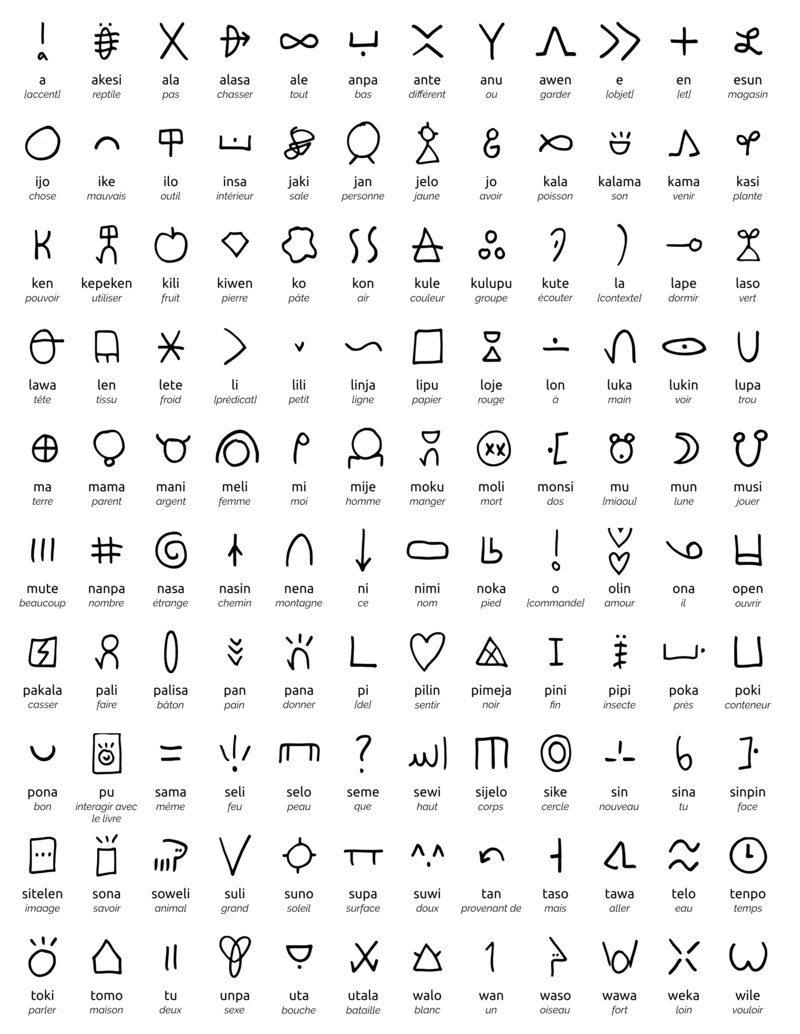
Il est possible d'installer la police de caractères correspondante au format otf qui se nomme linja-pona-4.2.otf.
Le guide sous windows pour procéder à l’installation :
- Click droit sur le fichier
linja-pona-4.2.otf→ installer - Lancer word et sélectionnant le nom de la police
linja-pona-4.2.otf - Dans word, faire click droit → police → Paramètres avancés → Ligatures : “standard uniquement”
- Pour utiliser des glyphes composés, mettre un trait d'union ou un plus entre deux mots, par exemple : toki-pona, linja+pona
- Pour utiliser des cartouches, utiliser des crochets et des traits de soulignement avant chaque glyphe, par exemple : ma [_kasi_alasa_nasin_awen_telo_aa] li suli
- Pour utiliser un pi long, mettre un trait d’union ou un signe plus après un pi. Plus on saisit de tirets ou de signes plus, plus le pi sera long. La longueur maximale est de 3 tirets ou signes plus. ex. : toki pi+ma-pona, toki pi++ma pona, toki pi+++ma pona suli

Services similaires en ligne :
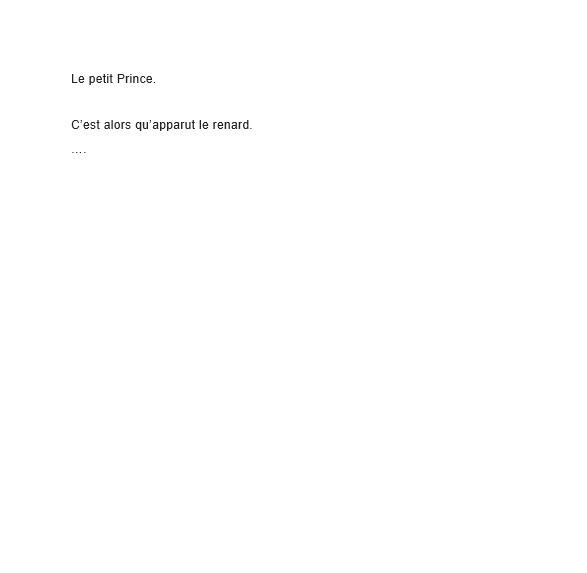
Des hiéroglyphes maya sitelen sitelen
Date de création : 08/08/2020 09:41
Il existe une “version maya” des hiéroglyphes sitelen pona, très esthétiques de mon point de vu, qui se nomme sitelen sitelen :
La “version maya” sillabaire :
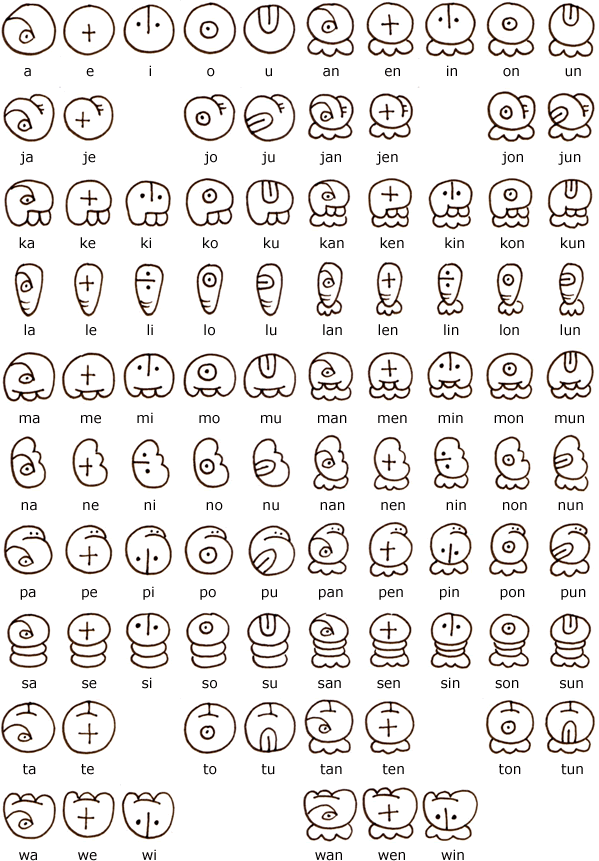
La “version maya” non sillabaire (représentant les mots de la langue) :
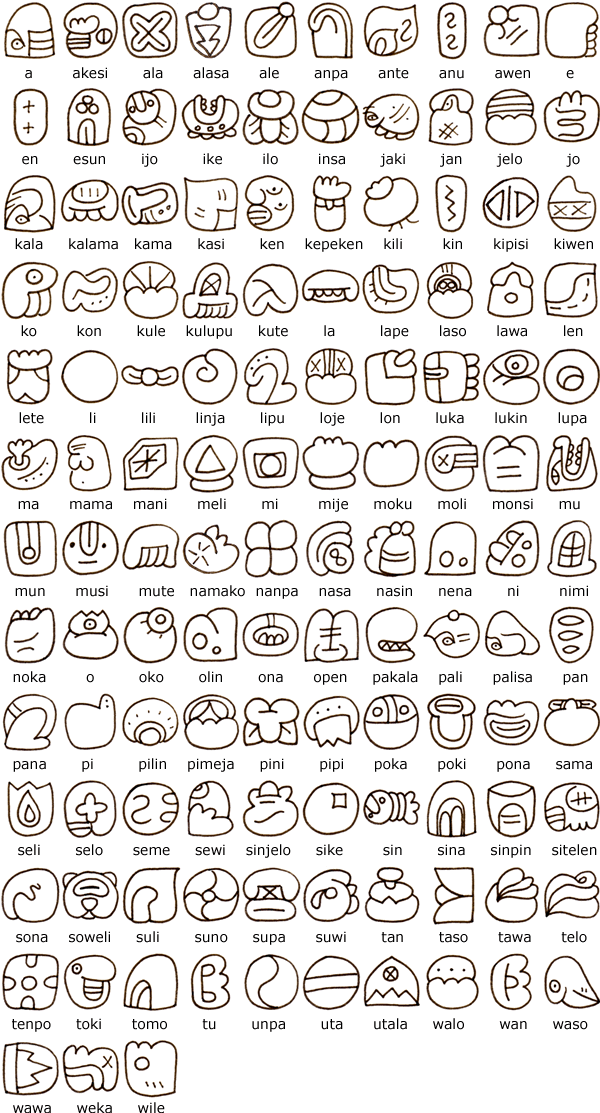
Voici les prépositions / “conteneurs” du langage :
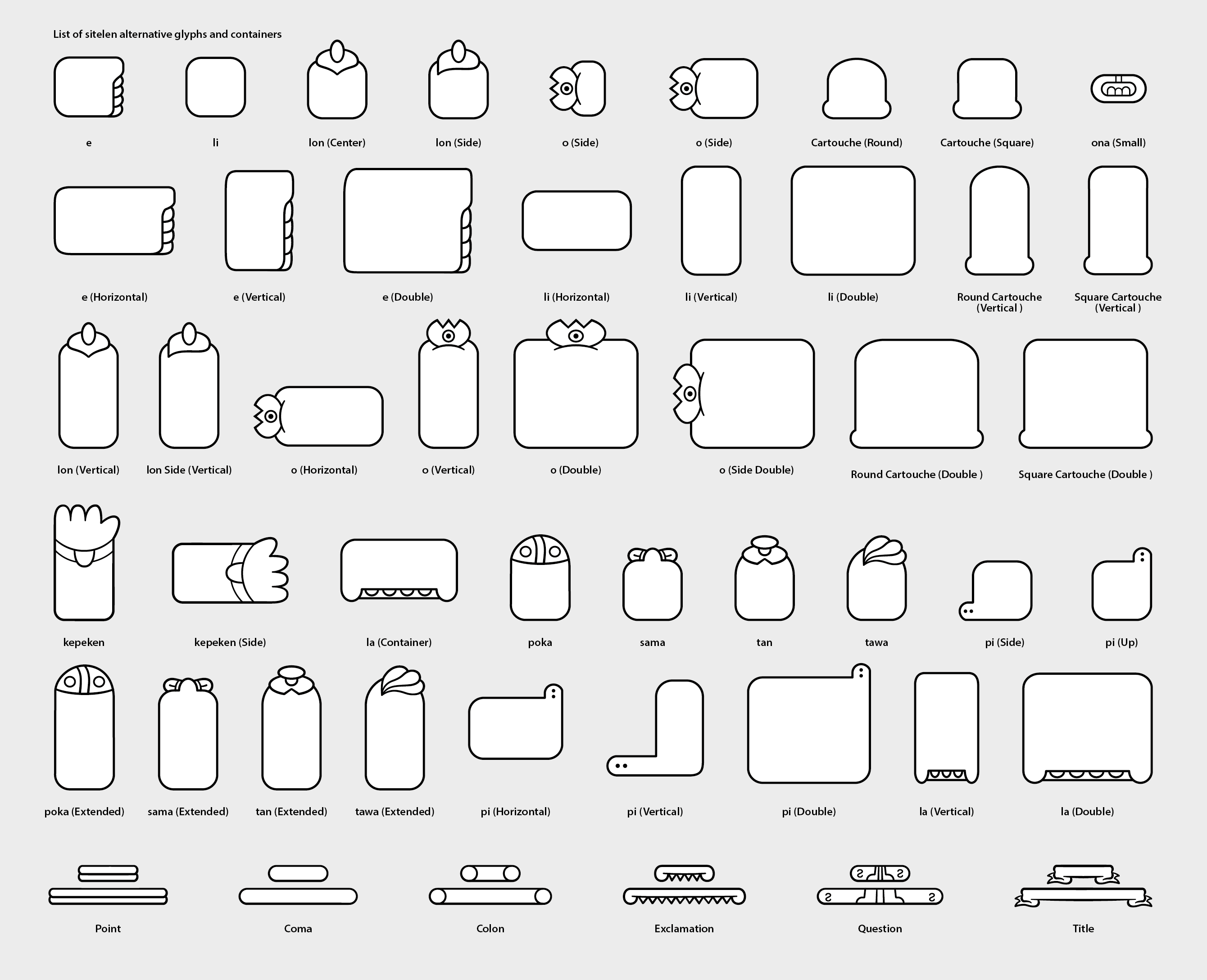
Connais-toi toi même ! → o sona e sina!
o → marque l'impératif
sona → verbe savoir /. connaître
e → COD
sina → pronom “tu”
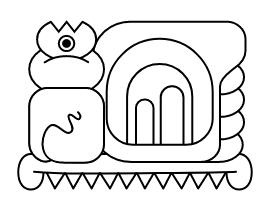
L'enfer c'est les autres. → tomo anpa li tomo ona.
tomo → bâtiment, maison
anpa → en bas
li → COD
ona → lui, ils, elle, elles, eux, les autres
